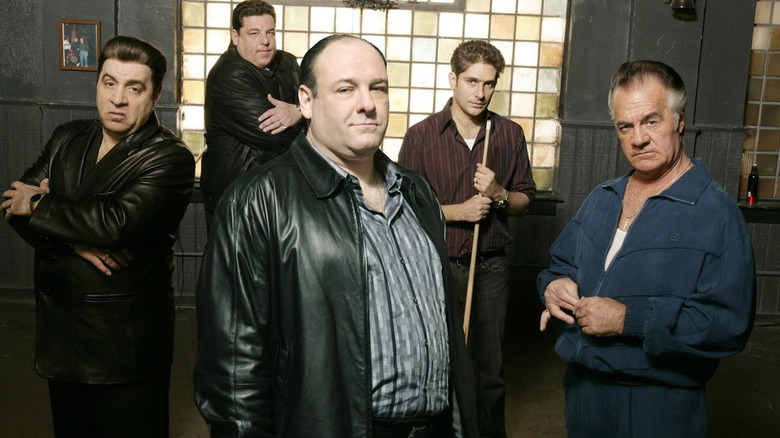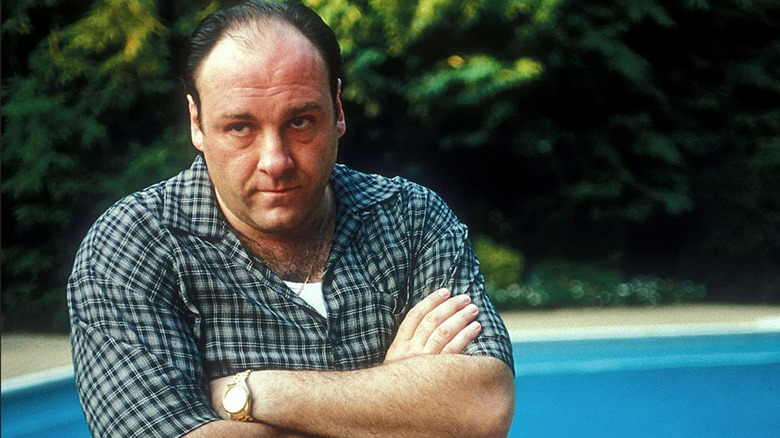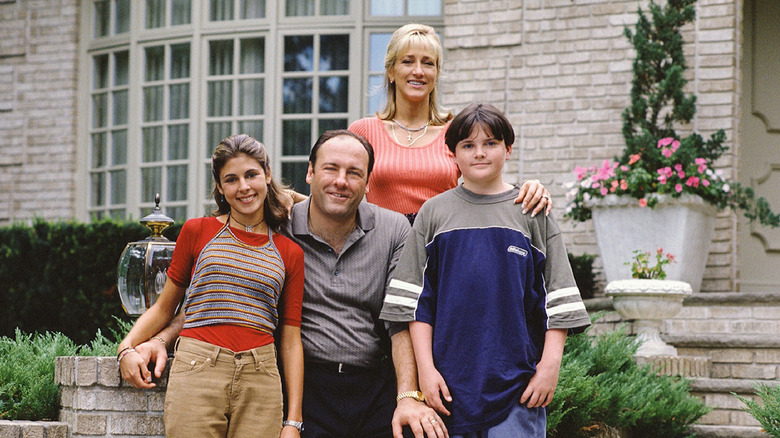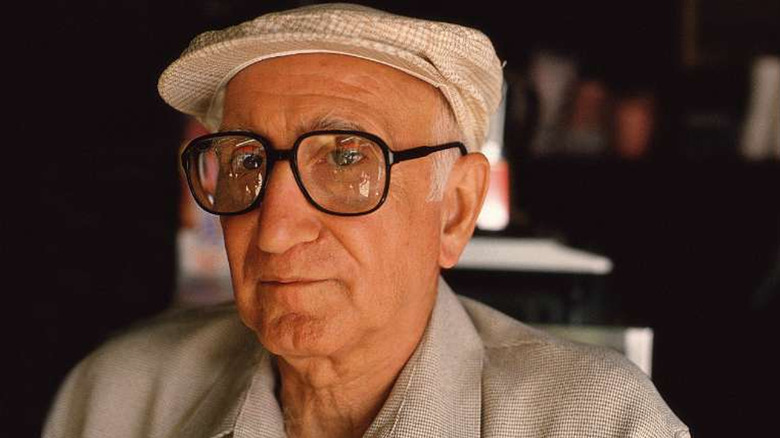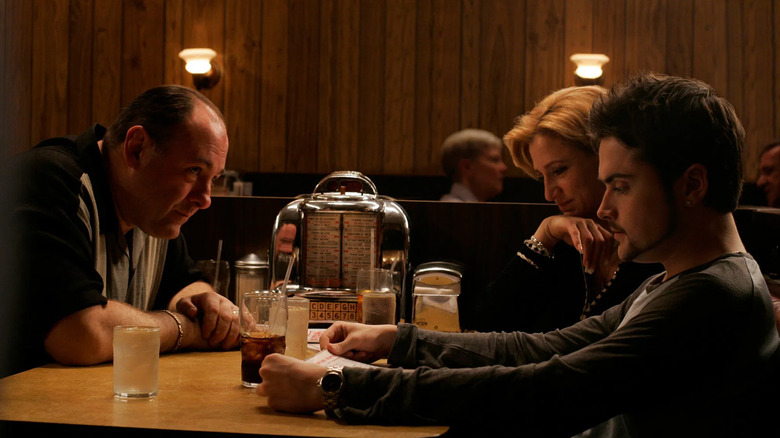The Real-Life Mobster Who Inspired The Sopranos
Landmark American crime drama "The Sopranos" is renowned for its authenticity. The story of Tony Soprano (James Gandolfini) tackling his mental health issues while balancing family life and his duties as a mob boss made for some of the most gripping television of all time. Often thought to be one of the greatest TV shows ever made, it's obvious that "The Sopranos" is grounded in reality.
Sure, we've seen plenty of mob movies of the years, with "The Godfather" and "Goodfellas" among the very best, but nothing quite captured the crushing dread of organized crime like "The Sopranos."
"Those who want respect, give respect."
That's how it was in the hit HBO series, and it's a mantra that forms the backbone of the real-life Cosa Nostra. It's all about respect, and it can be difficult to get it when you have to balance the conflicting needs of your family with those of the mafia family you control. That's where "The Sopranos" really excels — depicting the internal struggles of a mobster just trying to hold it all together. The truly remarkable part? It's not entirely fictitious.
Here's the guy who inspired it all.
Vincent 'Vinny Ocean' Palermo
Former New Jersey mob boss Vincent Palermo is said to be the inspiration behind Tony Soprano, and it's easy to see why.
Born on June 4, 1944, he was raised in a traditional American-Italian family in Brooklyn, New York. After earning the nickname "Vinny Ocean" while working in a New Jersey fish market, he married into the DeCavalcante crime family. And so began a long and memorable career in the New Jersey mafia, as he became involved in loansharking, illegal gambling, and even racketeering.
Much like Tony Soprano, he eventually became a capo. He was given his own crew of soldiers following the death of a real estate developer, Fred Weiss, a murder in which Palermo was involved. He later became the de facto boss of the DeCavalcante family after a power struggle within, mirroring Tony Soprano's rise to the top.
Even the mob themselves saw similarities. FBI recordings of the DeCavalcante family found them discussing the show:
"Hey, what's this f****** thing, Sopranos? What the f*** are they? Is that supposed to be us? Every show you watch, more and more, you pick up somebody ... There's a pork store. Yeah, in Jersey, right? They got a topless joint over there. Jesus."
The recordings, and their discussion of "The Sopranos," were used in court to convict four men of murder, racketeering, extortion, illegal gambling, bribery, and organized crime.
Palermo even owned a strip club called Wiggles, the inspiration for the Bada Bing! strip joint in "The Sopranos."
'Family – they're the only ones you can depend on'
Tony Soprano is all about his family — a devoted father who even took in his wife's first cousin (once removed) and treats him as his own. This relationship between Tony and Christopher Moltisanti (Michael Imperioli) forms a key part of "The Sopranos" and can be seen in the real-life mob boss, Vincent Palermo. He was said to be very protective of children and a devoted family man, driving his daughters each week to Brownies and watching "Annie" with them regularly. He also took in a troubled teenager named Richard and became his godfather, allowing the boy to stay with his family every weekend to study the Catholic sacraments.
And when it comes to family, the similarities extend to their crime families, too.
Much like the DiMeo crime family in "The Sopranos," the DeCavalcante family had its own fair share of power struggles. Again, the show echoes real-life — Junior Soprano is the DiMeo crime boss in name only, while Tony is the guy who really runs the show. This was identical to the DeCavalcante crime family, who were headed up by Giovanni Riggi in absentia during his time in jail ... but by the mid-'90s were actually being run by Palermo.
If that's not evidence enough that Vincent Palermo is the real Tony Soprano, then the murder of a disgraced mob boss really seals the deal.
The fall of 'Johnny Boy' D'Amato
After DeCavalcante boss Giovanni Riggi was sent down in 1989, John "Johnny Boy" D'Amato became the crime family's acting boss. All may have seemed well, but trouble was brewing beneath the surface with a Family scandal about to reach boiling point. After a vicious argument, D'Amato's girlfriend told the Family that he was bisexual. According to her, D'Amato had been frequenting Manhattan sex clubs, meeting with both male and female swingers. A later testimony by hitman Anthony Capo revealed the Family was worried that if the other Mafia families found out about D'Amato's "gay" behavior, it would cause them to lose respect for the Family.
That sealed it — 'Johnny Boy' D'Amato had to go.
A coup took place in 1992, with several Family members involved in the killing of D'Amato. And while Palermo himself was thought to be involved, he would later take the stand as a state witness against his former associates.
What does this have to do with "The Sopranos?" Well, in the episode "Boca," Tony's uncle, Junior (Dominic Chianese) is praised for his oral sex skills by his girlfriend, Bobbi Sanfillipo (Robyn Peterson). But he can't let word of this get out.
"They think if you suck p****, you'll suck anything. It's a sign of weakness."
Luckily for Junior, this didn't result in his death. But he equally lost the respect of his Family when Tony makes veiled references to his uncle's oral sex prowess. It's a treacherous power play that undermines Junior ... and pushes Junior to make some unwise decisions.
What happened to Vincent Palermo?
The DeCavalcante crime family may have strong allies with the Five Families, but they're not above the law. Soon enough, the FBI was crawling all over Vincent Palermo's operations, in a move that echoed "The Sopranos."
After a botched robbery of the Bank of America in 1998, DeCavalcante associate Ralph Guarino was arrested by the FBI and ultimately recruited as an informant. Just a year later, the FBI had enough on Vincent Palermo to arrest him — possibly even on capital offenses. Vincent "Vinny Ocean" Palermo became a state witness.
Palermo confessed to the murder of Fred Weiss, among others. Worse still, he implicated other DeCavalcante family members in a catalog of organized crimes. After taking to the stand, Palermo and his family were forced to enter the Witness Protection Program.
Unlike Tony Soprano, who may have met a sticky end in the finale of "The Sopranos," Palermo was last seen operating another strip club in Houston, Texas under the name "James Cabella." By 2013, he was forced to file for bankruptcy.
Not quite a Hollywood ending ... but it beats getting whacked by the Family.
